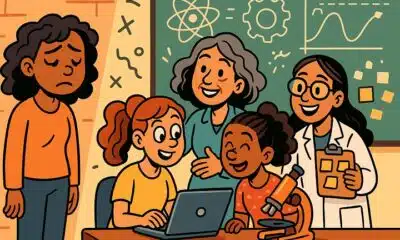Podcasts
Three AI experts on how access to ChatGPT-style tech is about to change our world – podcast
Three AI experts on how access to ChatGPT-style tech is about to change our world – podcast

ktsimage via Canva
Daniel Merino, The Conversation and Nehal El-Hadi, The Conversation
ChatGPT burst onto the technology world, gaining 100 million users by the end of January 2023, just two months after its launch and bringing with it a looming sense of change.
The technology itself is fascinating, but part of what makes ChatGPT uniquely interesting is the fact that essentially overnight, most of the world gained access to a powerful generative artificial intelligence that they could use for their own purposes. In this episode of The Conversation Weekly, we speak with researchers who study computer science, technology and economics to explore how the rapid adoption of technologies has, for the most part, failed to change social and economic systems in the past – but why AI might be different, despite its weaknesses.
Spending just a few minutes playing with new, generative AI algorithms can show you just how powerful they are. You can open up Dall-E, type in a phrase like “dinosaur riding motorcycle across a bridge,” and seconds later, the algorithm will produce multiple images more or less depicting what you asked for. ChatGPT does much the same, just with text as its output.

The Conversation/OpenAI, CC BY-ND
These models are trained on huge amounts of data taken from the internet, and as Daniel Acuña, an associate professor of computer science at the University of Colorado, Boulder, in the U.S. explains, that can be a problem. “If we are feeding these models data from the past and data from today, they will learn some biases,” Acuña says. “They will relate words – let’s say about occupations – and find relationships between words and how they are used with certain genders or certain races.”
The problem of bias in AI is not new, but with increased access, more people are now using it, and as Acuña says, “I hope that whoever is using those models is aware of these issues.”
With any new technology there is always a risk of misuse, but these concerns are usually accompanied by hope that as people gain access to better tools, their lives will improve. That theory is exactly what Kentaro Toyama, a professor of community information at the University of Michigan, has studied for nearly two decades.
“What I ultimately discovered was that it is quite possible to get research results that were positive, where some kind of technology would enhance a situation in a government or school, or in a clinic,” explains Toyama. “But it was nearly impossible to take that technological idea and then have it have impact at wider scales.”
Ultimately, Toyama came to believe that “technology amplifies underlying human forces. And in our current world, those human forces are aligned in a way that the rich get richer and inequality keeps growing.” But he was open to the idea that if AI could be inserted into a system that was trying to improve equality, then it would be an excellent tool for that.
Technologies can change social and economic systems when access increases, according to Thierry Rayna, an economist who studies innovation and entrepreneurship. He has studied how widespread access to digital music, 3D printing, block chain and other technologies fundamentally change the relationship between producers and consumers. In each of these cases, “increasingly people have become prosumers, meaning they are actively involved in the production process.” Rayna predicts the same will be true with generative AI.
Rayna says that “In a situation where everybody’s producing stuff and people are consuming from other people, the main issue is that choice becomes absolutely overwhelming.” Once an economic system reaches this point, according to Rayna, platforms and influences become the wielders of power. But Rayna thinks that once people can not only use AI algorithms, but train their own, “It will probably be the first time in a long time that the platforms will actually be in danger.”
This episode was written and produced by Katie Flood and hosted by Dan Merino. The interim executive producer is Mend Mariwany. Eloise Stevens does our sound design, and our theme music is by Neeta Sarl.
You can find us on Twitter @TC_Audio, on Instagram at theconversationdotcom or via email. You can also subscribe The Conversation’s free daily email here. A transcript of this episode will be available soon.
Listen to “The Conversation Weekly” via any of the apps listed above, download it directly via our RSS feed or find out how else to listen here.
Daniel Merino, Associate Science Editor & Co-Host of The Conversation Weekly Podcast, The Conversation and Nehal El-Hadi, Science + Technology Editor & Co-Host of The Conversation Weekly Podcast, The Conversation
This article is republished from The Conversation under a Creative Commons license. Read the original article.
Mississippi Today
Political stumping mild at Neshoba County Fair
Mississippi Today’s politics team recaps the 2025 Neshoba County Fair. This year’s political speaking lacked some of the fire and brimstone of big election years, but state leaders laid out some major policy plans sure to dominate debate in the next legislative session.
This article first appeared on Mississippi Today and is republished here under a Creative Commons Attribution-NoDerivatives 4.0 International License.
The post Political stumping mild at Neshoba County Fair appeared first on mississippitoday.org
Crooked Letter Sports Podcast
Rusty Hampton and the glory years of sports writing
Rusty Hampton was the sports editor at the Clarion Ledger for 11 years and worked there for 25 years in two different stints. He talks about some of the highlights, including Mississippi State’s amazing run to the 1996 Final Four.
Also discussed: a salute to Ryne Sandberg, the SEC preseason football poll, and Konnor Griffin, the newly elevated top prospect in professional baseball.
Stream all episodes here.
This article first appeared on Mississippi Today and is republished here under a Creative Commons Attribution-NoDerivatives 4.0 International License.
The post Rusty Hampton and the glory years of sports writing appeared first on mississippitoday.org
Mississippi Today
Why Andy Gipson is running for governor
Republican Andy Gipson, the first candidate to publicly announce a run for Mississippi governor in 2027, outlines his five-plank platform. No. 1 is fighting crime, which Gipson says is rising in what were once quiet rural areas, because “If people don’t feel safe, nothing else matters.” He also offers a brief sampling of his baritone crooning from his just-released two studio albums.
This article first appeared on Mississippi Today and is republished here under a Creative Commons Attribution-NoDerivatives 4.0 International License.
The post Why Andy Gipson is running for governor appeared first on mississippitoday.org
-
News from the South - Texas News Feed2 days ago
New Texas laws go into effect as school year starts
-
News from the South - Texas News Feed5 days ago
Kratom poisoning calls climb in Texas
-
News from the South - Tennessee News Feed5 days ago
GRAPHIC VIDEO WARNING: Man shot several times at point-blank range outside Memphis convenience store
-
News from the South - Florida News Feed2 days ago
Floridians lose tens of millions to romance scams
-
News from the South - Kentucky News Feed5 days ago
Unsealed warrant reveals IRS claims of millions in unreported sales at Central Kentucky restaurants
-
News from the South - Arkansas News Feed7 days ago
Idaho is losing OB-GYNs. Doctors who remain are trying to shoulder the extra burdens.
-
Mississippi Today5 days ago
‘Get a life,’ Sen. Roger Wicker says of constituents
-
News from the South - Missouri News Feed7 days ago
Leavenworth mother found guilty in death of 1-year-old daughter





















































